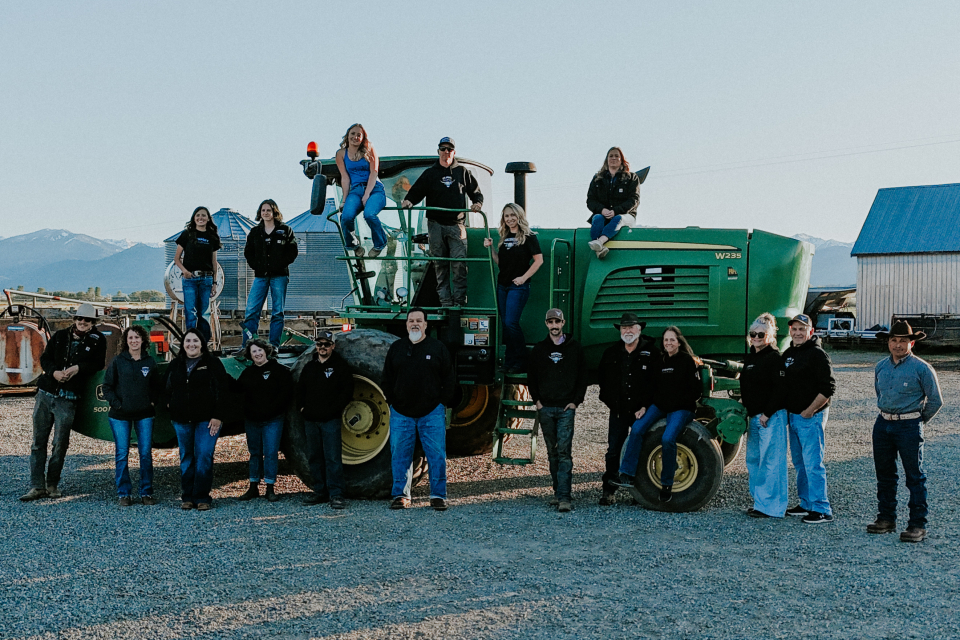StarWalker’s Vision: “We strive to be a leader in regenerative agriculture, inspiring a global movement towards farming practices that heal the earth, cultivate vibrant ecosystems, and provide nutritious food. Our goal is to create a legacy of sustainability and stewardship that benefits future generations.”
The Walker family has spent more than five decades tending to their land with care and conviction. Nestled in Northern California’s Scott Valley, StarWalker Organic Farms spans 7,000 acres beneath the Marble Mountains and is home to Highland cattle, heritage pigs, and a rotation of organic crops that include alfalfa, wheat, and peas. From the beginning, the family has held a clear philosophy: food should be grown in ways that restore land, nourish communities, and leave behind more than they take.
Today, Jason and Kristina Walker carry this legacy forward with renewed purpose. Under their leadership, StarWalker has grown into the first and only Regenerative Organic Certified pork and beef operation in the United States, and the largest certified organic pork producer in the country. They’ve built a vertically integrated, closed-loop farming model where animals and crops support each other, and every step—from soil to harvest—is guided by ecological and economic care.
In 2020, they made a pivotal decision to grow their herds and launch a direct-to-consumer model—reaching households across the country with nutrient-dense, ethically raised meat. As demand grew, so did their vision. In 2024, they entered into a lease-to-purchase agreement on a USDA-inspected processing facility, enabling them to manage their own value chain and expand access for other regional producers.
The Walkers’ impact reaches beyond their own farm. Through their partner producer program and commitment to education and community engagement, they are helping build a more connected and transparent future for the meat industry. StarWalker has set a new benchmark for regenerative livestock production in the United States, offering a model that is flexible, participatory, and grounded in place.
The Walkers’ story has resonated far beyond their rural roots, helping bridge the gap between farmers and consumers. With a growing national customer base and an active presence online, they’ve become a source of inspiration for a broader movement. Through expanded processing capacity, transparent marketing, and support for partner producers pursuing Regenerative Organic Certification®, they are creating new pathways for regional farmers to thrive within a values-aligned supply chain.
The Walkers take genuine joy in welcoming others onto the farm, offering a firsthand glimpse of the quiet truth they have long been sowing: that agriculture and ecology can move in harmony. Guided by a closed-loop model that restores what it draws from the land, and a multi-generational ethic of care, StarWalker Organic Farms stands as more than a business. It is a living example of what becomes possible when people and land are given the time, trust, and tools to grow together.
Ecological, Social, and Economic Stewardship Practices
At StarWalker Organic Farms, regeneration is viewed as a long-standing commitment to working in sync with natural systems while producing nutrient-dense food for local and national markets. To consistently move towards this goal, the following practices are utilized:
Ecological Stewardship:
- Managed Grazing: Livestock are rotated through different pastures to allow land to rest and regenerate, improving forage quality and soil health.
- Living Roots Year-Round: Cover crops are planted between main crops to build fertility, protect against erosion, and keep soil biology active.
- Low Disturbance Practices: Minimal tillage preserves soil structure, retains moisture, and protects beneficial organisms below the surface.
- Biodiverse Planting: A mix of crops and pastures supports pollinators, enhances resilience, and strengthens the overall ecosystem.
- Soil Health Monitoring: Regular soil testing and digital tracking help guide adaptive management and measure ecological progress over time.
- Pasture-Raised Animal Welfare: Animals are raised outdoors with space to roam, express natural behaviors, and are only confined when necessary (e.g., farrowing). The Walkers maintain strict records to uphold their Organic, Regenerative Organic Certified®, and GAP 4 certifications.
Social Stewardship:
- Local Employment: Hiring from the local community for both farm and processing operations.
- Employee Care: Team members receive paid time off, access to farm-raised meat, and on-site housing when needed. Processing staff also benefit from a bonus structure tied to output quality and quantity.
- Food Access & Giving: The Walkers donate meat regularly to schools, food banks, and local events—with significant holiday season contributions.
Economic Stewardship:
- Farm-to-Table Transparency: Meat is sold directly to households and wholesale buyers with full traceability back to the farm.
- Localized Supply Chain: Wherever possible, materials like packaging and equipment are sourced from local or domestic suppliers.
- Family Ownership & Legacy: Committed to keeping the land and business family-owned, with a focus on long-term viability and stewardship.

